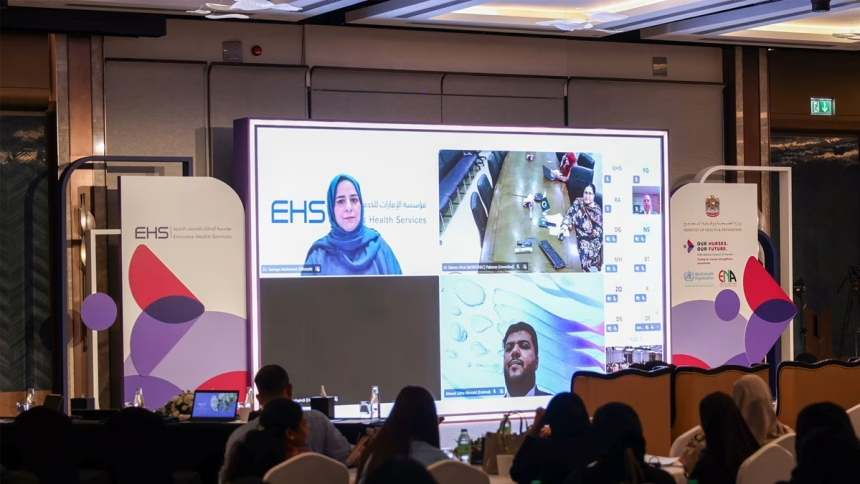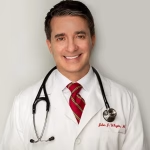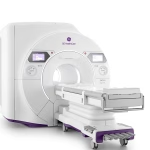- SoWN 2025 report charts a clear path forward for empowering the nursing profession
- H.E. Al Olama: “The UAE has established a pioneering model in empowering nursing professionals and advancing innovative specialization systems.”
- H.E. Al Serkal: “We will continue to strengthen the UAE’s role in shaping the future of health professions and ensuring the sustainability of healthcare systems.”
- Dr. Sumaya Al Blooshi: “The report’s findings highlight the UAE’s progress in developing an advanced institutional framework for the nursing profession.”
UAE, Dubai, May 12th, 2025: The Ministry of Health and Prevention (MoHAP) and Emirates Health Services (EHS) marked a significant milestone by hosting the regional launch of the State of the World’s Nursing (SoWN) 2025 report for the Eastern Mediterranean Region. Organized in collaboration with the World Health Organization (WHO), the virtual event brought together senior officials from MoHAP, EHS, WHO, and healthcare leaders across the region.
Held in celebration of International Nurses Day, this year themed “Our Nurses. Our Future. Caring for nurses strengthens economies”, the launch offered an in-depth overview of the report’s findings and its strategic roadmap for the global nursing profession. The event also featured a regional panel discussion with leading nursing experts from various countries, who explored the future landscape of nursing and shared best practices.
Report Outcomes
H.E. Dr. Mohammed Salim Al Olama, Undersecretary of the Ministry of Health and Prevention, emphasized that the report’s data-driven insights would serve as a critical reference point for enhancing the nursing sector across the region. “The findings and recommendations of the report will provide a strategic roadmap for developing the nursing profession at the regional level, strengthening its fundamental role in achieving universal health coverage,” he noted.
He recalled the UAE’s active involvement in shaping the inaugural 2020 report and the subsequent adoption of its guidance through the National Strategy for Nursing and Midwifery 2022–2026.
“In its second edition, the report offers a comprehensive, forward-looking perspective on the nursing workforce,” Al Olama said. “The UAE’s leadership in launching this report, in collaboration with the World Health Organization, stands as global recognition of our innovative and resilient healthcare model.”
He added: “This further solidifies our role as an active player in shaping the future of the profession and guiding professional development in the health sector across the region.”
He concluded by underscoring that the National Strategy for Nursing and Midwifery incorporates international best practices and leverages digital tools to enhance professional growth. This includes a national nursing leadership programme and an integrated digital platform for continuing education—initiatives that aim to elevate the competitiveness of the healthcare workforce and contribute to the “Year of Community 2025” vision by fostering well-being and social cohesion.
UAE Partners in Shaping the Future of Nursing
H.E. Dr. Yousif Mohamed Al Serkal, Director-General of Emirates Health Services, noted that hosting the SoWN 2025 report launch reflects the UAE’s growing influence in healthcare policy and innovation. “The UAE’s hosting of this landmark event in collaboration with the World Health Organization reaffirms its leading position in driving the development of the nursing profession regionally and globally,” he said.
He hailed the event as a key milestone in the UAE’s ongoing efforts to advance healthcare sustainability, guided by visionary leadership and aligned with the Sustainable Development Goals and We the UAE 2031 vision.
“The UAE has long recognized the pivotal role of nursing as a cornerstone of resilient health systems,” Al Serkal added. “Through forward-thinking policies, sustained investments in education, and a commitment to capacity building, we have consistently empowered our nursing workforce.”
“At Emirates Health Services, we will continue to align with national and global priorities, supporting nurses as essential drivers of a high-performing healthcare system.”
Advanced Organizational Model for the Nursing Profession
Dr. Sumaya Al Blooshi, Head of the National Committee for Nursing and Midwifery in the UAE, Director of the Nursing Department at Emirates Health Services, and President of the Emirates Nursing Association, highlighted the growing international appreciation for nurses’ roles in shaping modern healthcare.
“The second State of the World’s Nursing Report 2025 holds significant importance, as it reflects a shift in the global perception of the nursing profession and growing recognition of nurses as key partners in shaping the future of healthcare,” she said.
She affirmed that the UAE’s leadership in hosting the launch illustrates the country’s success in building a structured, scientifically grounded, and high-quality institutional framework for the profession.
“In line with this commitment, Emirates Health Services continues to strengthen its support for the nursing workforce, ensuring that practices are aligned with strategic objectives. Our goal is to build and sustain a health human capital model that can meet future challenges while advancing the vision of our leadership to empower nurses as central contributors to a future-ready healthcare system,” she added.
SoWN Report Overview
The SoWN 2025 report presents a global snapshot of the nursing workforce, its achievements, and its urgent needs. It emphasizes the profession’s critical role in achieving universal health coverage and the Sustainable Development Goals (SDGs).
A key concern raised is the projected global shortfall of 4.1 million nurses by 2030, with 70% of this deficit expected to affect Africa and the Eastern Mediterranean regions. The report also reveals an alarming disparity in nurse distribution, with 78% of nurses serving just 49% of the world’s population—highlighting the urgent need for action in low-income nations.
Encouragingly, the report notes that 92% of countries now have regulatory frameworks for nursing in place, and 62% have introduced advanced nursing roles to enhance care delivery in underserved communities.
The report identifies five core actions for governments and health leaders: expanding recruitment efforts, introducing evidence-based retention strategies, improving education quality, enhancing working conditions and wages, and elevating the voice of nursing leadership in decision-making. It also encourages future-ready priorities such as digital health integration and advanced practice nursing from 2026 to 2030.
Ultimately, the report affirms that investing in nursing is a catalyst not only for stronger health systems but for economic growth, job creation, and increased gender equity in the workforce. It calls for embracing AI and digital transformation to future-proof the profession and effectively respond to evolving global health challenges.



















